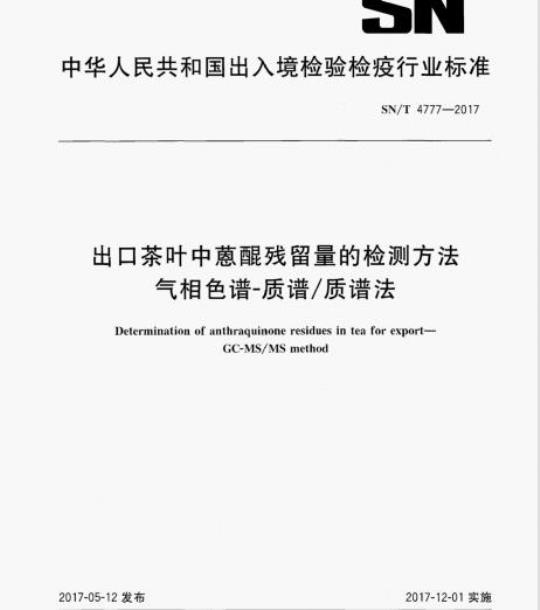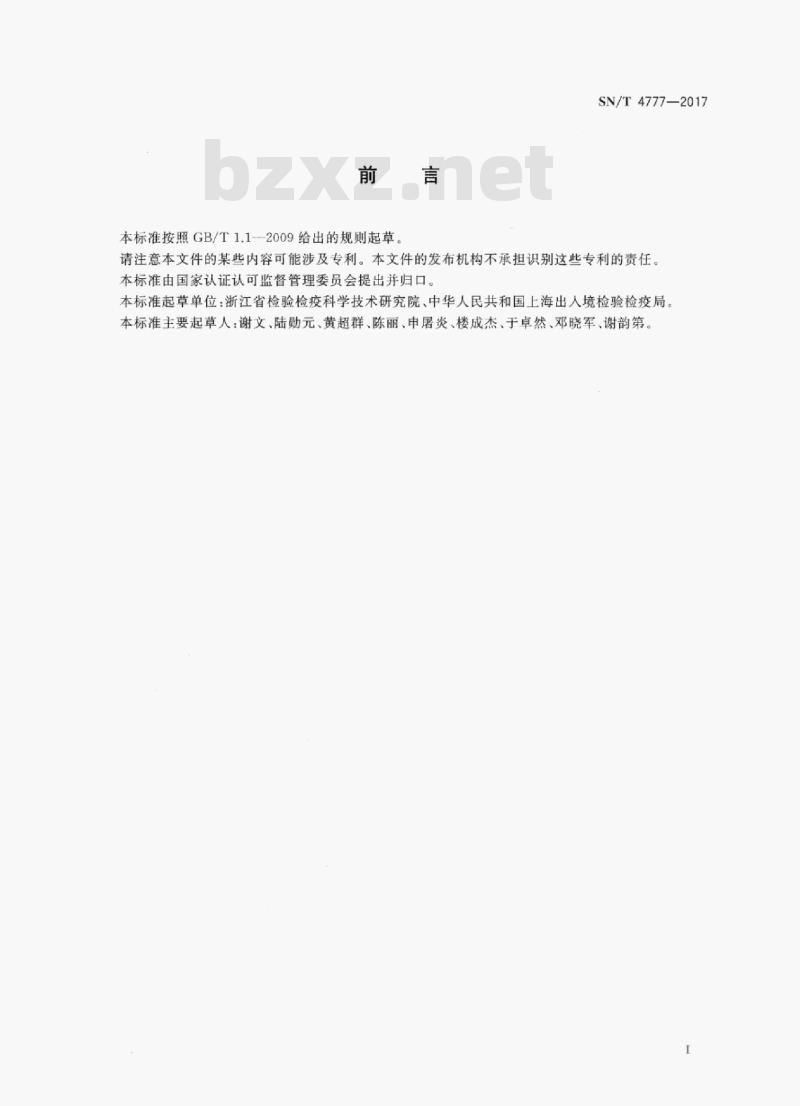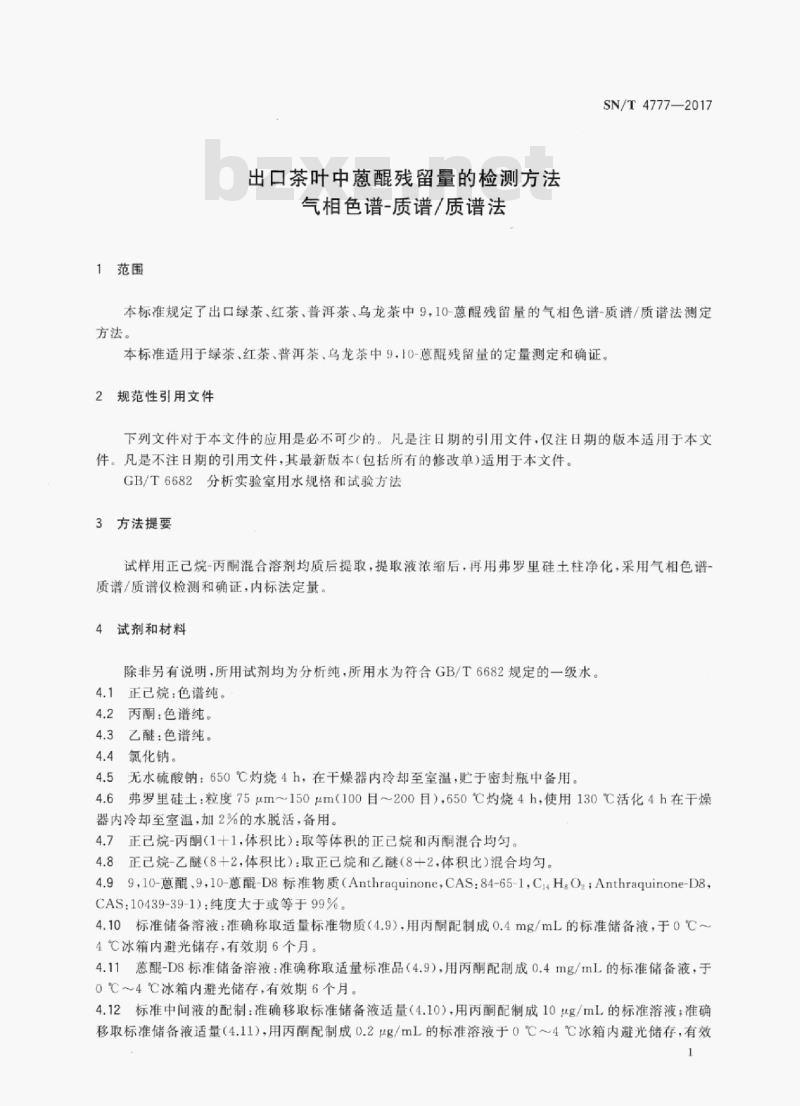SN/T 4777-2017
基本信息
标准号: SN/T 4777-2017
中文名称:出口茶叶中蒽醌残留量的检测方法气相色谱-质谱/质谱法
标准类别:商检行业标准(SN)
标准状态:现行
出版语种:简体中文
下载格式:.zip .pdf
下载大小:1701907
相关标签: 出口 茶叶 残留量 检测 方法 相色谱 质谱 质谱法

标准分类号
关联标准
出版信息
相关单位信息
标准简介
SN/T 4777-2017.Determination of anthraquinone residues in tea for export-GC-MS/MS method.
1范围
SN/T 4777规定了出口绿茶、红茶、普洱茶、乌龙茶中9,10-蒽醌残留量的气相色谱-质谱/质谱法测定方法。
SN/T 4777适用于绿茶、红茶、普洱茶、乌龙茶中9.10-蒽醌残留量的定量测定和确证。
2规范性引用文件
下列文件对于本文件的应用是必不可少的。凡是注日期的引用文件,仅注日期的版本适用于本文件。凡是不注日期的引用文件,其最新版本(包括所有的修改单)适用于本文件。
GB/T 6682分 析实验室用水规格和试验方法
3方法提要
试样用正己烷丙酮混合溶剂均质后提取,提取液浓缩后,再用弗罗里硅土柱净化,采用气相色谱-质谱/质谱仪检测和确证,内标法定量。
4试剂和材料
除非另有说明,所用试剂均为分析纯,所用水为符合GB/T 6682规定的一级水。
4.1
正已烷:色谱纯。
4.2丙酮: 色谱纯。
4.3乙醚: 色谱纯。
4.4氯化钠。
4.5无水硫酸钠: 650 °C灼烧4 h,在干燥器内冷却至室温,贮于密封瓶中备用。
4.6弗罗 里硅士:粒度75μm~150μm(100目~200目),650℃灼烧4h,使用130℃活化4 h在干燥器内冷却至室温,加2%的水脱活,备用。
4.7正已烷-丙酮(1+1,体积比):取等体积的正己烷和丙酮混合均匀。
4.8 正己烷-乙醚(8+2,体积比):取正己烷和乙醚(8+2,体积比)混合均匀。
1范围
SN/T 4777规定了出口绿茶、红茶、普洱茶、乌龙茶中9,10-蒽醌残留量的气相色谱-质谱/质谱法测定方法。
SN/T 4777适用于绿茶、红茶、普洱茶、乌龙茶中9.10-蒽醌残留量的定量测定和确证。
2规范性引用文件
下列文件对于本文件的应用是必不可少的。凡是注日期的引用文件,仅注日期的版本适用于本文件。凡是不注日期的引用文件,其最新版本(包括所有的修改单)适用于本文件。
GB/T 6682分 析实验室用水规格和试验方法
3方法提要
试样用正己烷丙酮混合溶剂均质后提取,提取液浓缩后,再用弗罗里硅土柱净化,采用气相色谱-质谱/质谱仪检测和确证,内标法定量。
4试剂和材料
除非另有说明,所用试剂均为分析纯,所用水为符合GB/T 6682规定的一级水。
4.1
正已烷:色谱纯。
4.2丙酮: 色谱纯。
4.3乙醚: 色谱纯。
4.4氯化钠。
4.5无水硫酸钠: 650 °C灼烧4 h,在干燥器内冷却至室温,贮于密封瓶中备用。
4.6弗罗 里硅士:粒度75μm~150μm(100目~200目),650℃灼烧4h,使用130℃活化4 h在干燥器内冷却至室温,加2%的水脱活,备用。
4.7正已烷-丙酮(1+1,体积比):取等体积的正己烷和丙酮混合均匀。
4.8 正己烷-乙醚(8+2,体积比):取正己烷和乙醚(8+2,体积比)混合均匀。
标准图片预览





标准内容
中华人民共和国出入境检验检疫行业标准SN/T4777—2017
出口茶叶中葱鲲残留量的检测方法气相色谱-质谱/质谱法
Determination of anthraquinone residues in tea for export-GC-MS/MSmethod
2017-05-12发布
中华人民共和国
国家质量监督检验检疫总局
2017-12-01实施
本标准按照GB/T1.1-2009给出的规则起草SN/T4777—2017
请注意本文件的某些内容可能涉及专利。本文件的发布机构不承担识别这些专利的责任。本标准由国家认证认可监督管理委员会提出并归口。本标准起草单位:浙江省检验检疫科学技术研究院、中华人民共和国上海出人境检验检疫局本标准主要起草人:谢文、陆勋元、黄超群、陈丽、申屠炎、楼成杰、于卓然、邓晓军、谢韵第。I
1范围
出口茶叶中葱醒残留量的检测方法气相色谱-质谱/质谱法
SN/T4777—2017
本标准规定了出口绿茶、红茶、普洱茶、乌龙茶中9,10-葱醒残留量的气相色谱-质谱/质谱法测定方法。
本标准适用于绿茶、红茶、普洱茶、乌龙茶中9.10-蕙醒残留量的定量测定和确证。2规范性引用文件
下列文件对于本文件的应用是必不可少的。凡是注日期的引用文件,仅注日期的版本适用于本文件。凡是不注日期的引用文件,其最新版本(包括所有的修改单)适用于本文件。GB/T6682分析实验室用水规格和试验方法3方法提要
试样用正已烷-丙酮混合溶剂均质后提取,提取液浓缩后,再用弗罗里硅土柱净化,采用气相色谱一质谱/质谱仪检测和确证,内标法定量。试剂和材料
除非另有说明,所用试剂均为分析纯,所用水为符合GB/T6682规定的一级水。4.1正已烷:色谱纯。
4.2丙酮:色谱纯。
乙醚:色谱纯。
氯化钠。
无水硫酸钠:650℃灼烧4h,在干燥器内冷却至室温,贮于密封瓶中备用。弗罗里硅土:粒度75μm~150μm(100目~200目),650℃灼烧4h,使用130℃活化4h在干燥4.6
器内冷却至室温,加2%的水脱活,备用。4.7正已烷-丙酮(1十1,体积比):取等体积的正已烷和丙酮混合均勾。4.8正已烷-乙醚(8+2,体积比):取正已烷和乙醚(8+2,体积比)混合均勾。4.99,10-蕙配、9,10-葱醒-D8标准物质(Anthraquinone,CAS:84-65-1,CHO2:Anthraquinone-D8CAS:10439-39-1):纯度大于或等于99%。4.10标准储备溶液:准确称取适量标准物质(4.9),用丙酮配制成0.4mg/mL的标准储备液,于0℃~~4℃冰箱内避光储存,有效期6个月。4.11葱醒-D8标准储备溶液:准确称取适量标准品(4.9),用丙酮配制成0.4mg/mL的标准储备液,于0℃~4℃冰箱内避光储存,有效期6个月。4.12标准中间液的配制:准确移取标准储备液适量(4.10),用丙酮配制成10μg/mL的标准溶液;准确移取标准储备液适量(4.11),用丙酮配制成0.2μg/mL的标准溶液于0℃~4℃冰箱内避光储存,有效1
SN/T4777—2017
期3个月。
4.13标准工作溶液的配制:根据需要将标准中间溶液(4.12)用丙酮稀释成适当浓度的标准工作溶液4.14净化柱:200mm×15mm(内径)玻璃柱,底部垫约5mm高脱脂棉和约10mm高无水硫酸钠,10g弗罗里硅土(4.6),用正已烷湿法装柱,顶端加约10mm高无水硫酸钠,弃去淋洗液(在使用前需先做淋洗曲线。
4.15微孔滤膜:0.22um,有机相型。5仪器和设备
5.1气相色谱-质谱/质谱仪:配有(EI)离子源。5.2分析天平:感量0.0001g和0.01g。5.3涡旋混合器。
5.4均质器
5.5离心机:最大转速4000r/min。5.6旋转蒸发仪。
5.7粉碎机。
6试样制备与保存
取代表性样品约250g,经粉碎机粉碎并全部通过20目圆孔筛,混匀,装人洁净容器内密封,并标明标记。
在制样的操作过程中,应防正样品污染或发生残留物含量的变化7测定步骤
7.1提取
称取茶叶试样2g(精确至0.01g)于50mL离心管中,加人0.5mL葱醒-D8(4.12),再加人20mL正已烷-内酮(4.7),以10000r/min均质0.5min,加人2g氯化钠,涡旋1min,以4000r/min离心3min,将上层提取溶液转移人浓缩瓶中,用20mL正已烷-内酮(4.7)清洗均质器刀头,并将此提取液倒人残渣中,涡旋1min,以4000r/min离心3min,合并提取液,在45℃以下水浴减压浓缩至近干,待净化。
7.2净化
用3mL正已烷溶解残渣,并转移至净化柱(4.14),再用50mL正已烷-乙醚(4.8)混合溶剂,流速为3mL/min,收集全部洗脱液,在45℃以下水浴减压浓缩至近干,加人2.0mL丙酮溶解残渣,混匀,过0.22um滤膜(4.15),供气相色谱-质谱/质谱仪测定。7.3测定
7.3.1气相色谱-质谱/质谱条件
7.3.1.1色谱柱:HP-5MS,30m(长度)×0.25mm(内径)X0.25um(膜厚),或相当者。7.3.1.2程序柱温:100℃保持1min,以20℃/min的速率升温至300℃,保持10min。7.3.1.3载气:氮气,纯度≥99.999%,流速1.0mL/min。2
7.3.1.4进样口温度:300℃。
7.3.1.5进样方式:不分流进样,1min后开阀。7.3.1.6进样量:1L。
7.3.1.7电离方式:EI。
电离能量:70eV。
离子源温度:280℃。
接口温度:300℃。
测定方式:选择反应监测模式(SRM)。监测离子对:见表1。
表1定性离子对、定量离子对、碰撞气能量(CE)、采集时间窗化合物名称
葱醌-D8
注:“”为定量离子对。
7.3.2定量测定
蓝测离子(m/z)
208.0/180.0*
208.0/151.7
215.9/188.0
SN/T4777—2017
碰撞气能量
(CE)/V
根据试样中被测物的含量,选取响应值适宜的标准工作溶液进行分析。标准工作液和待测样液中葱醒的响应值均应在仪器线性响应范围内。在上述色谱条件下葱醒的参考保留时间8.6min,标准溶液的选择反应监测色谱图参见附录A中图A.1。7.3.3定性测定
在上述实验条件下,样品中待测物质的保留时间,与标准溶液的保留时间偏差在士0.5%之内;化合物的质谱定性离子至少应包括一个母离子和两个子离子,且样品中定性离子的相对丰度与标准品溶液对应的定性离子的相对丰度比进行比较,偏差不超过表2规定的范围,则可判断样品中存在被测物。表2相对离子丰度最大容许误差
相对离子丰度/%
允许的相对偏差/%
空白试验
除不加试样外,均按上述操作步骤进行。7.5结果计算和表述
>20-50
>10~20bzxZ.net
用色谱数据处理机或按式(1)计算试样中葱醒的残留量,计算结果应扣除空白值X=×V×1000
mX1000
式中:
X一一试样中蕙醒的残留量,单位为毫克每千克(mg/kg);10
SN/T4777—2017
c—一从标准曲线上得到的葱醒的溶液浓度,单位为微克每毫升(pg/mL):V样液最终定容体积,单位为毫升(mL);最终样液所代表的试样质量,单位为克(g)。m
测定低限和回收率
测定低限
本方法的测定低限均为0.02mg/kg。8.2
回收率
不同茶叶中添加不同浓度水平葱配标准溶液的回收率范围参见附录B中表B.1。4
附录A
(资料性附录)
标准溶液的气相色谱-质谱/质谱选择反应监测色谱图葱醒、葱醒-D8混合标准溶液选择反应监测色谱图见图A.1。100-
208.0/180.0
208.0/151.7
215.9/188.0
时间/min
SN/T4777—2017
葱醒、葱醒-D8混合标准溶液选择反应监测色谱图(0.02mg/kg)图A.1
SN/T4777—2017
附录B
(资料性附录)
不同茶叶中葱醒添加浓度及回收率不同茶叶中葱醒添加浓度及回收率见表B.1。表B.1
茶叶名称
普洱茶
乌龙茶
不同茶叶中葱醒添加浓度及回收率添加水平/(mg/kg)
回收率范围/%
85.0~105.0
75.0107.5
87.5~110.0
80.0~105.0
72.5~105.0
87.5~103.7
75.0~105.0
80.0107.5
77.5107.5
70.0~95.0
80.0107.5
78.7~102.5
Foreword
This standard was drafted in accordance with GB/T 1.1—2009.SN/T 4777—2017
Please note that some of the elements of this standard may involve patents, but the standards organization does not assume responsibility for identifying these patents.This standard was proposed by and is under the charged of Certification and Accreditation Administration of the People's Republic of China.This standard was drafted by Zhejiang Academy of Science& Technology for Inspection&Quarantine,Shanghai Entry-Exit Inspection and Quarantine Bureau of the People\s Republic of China.Themain draftersof this standard are Xie Wen,Lu Xunyuan,Huang Chaoqun,Chen Li, Shen Tuyan,Lou Chengjie,Yu Zhuoran, Deng Xiaojun,Xie Yundi.1) Note:This english version,a translation from the chinese text, is solely for guidance.SN/T4777-—2017
Determination of anthraquinone residues in tea forexport-Gc-Ms/Msmethod
1Scope
Thisstandard specifies themethod of samplepreparation and determinationby Gc-Ms/MS of 9,10.anthraquinone residues in green tea.black tea,pu'er tea and oolong for export.This standard specifies the method of determination 9,10-anthraquinone residues in green tea, blacktea,pu'erteaandoolongbyGc-Ms/Ms.2 Normative references
Following documents are necessary for this standard. For dated references, only dated editions shallapply to this standard. For undated references, the latest edition of the normative document referredtoapplies.
GB/T6682
Water for analytical laboratory use-Specification and test methods.3Principle
Anthraquinone residues are extracted from the sample with n-hexane-acetone. It is cleaned up withflorisil column. The residues are determined by GC-MS/MS and quantified by internal standard meth-od.
4Reagentsandmaterials
Unless otherwise specified, all reagents used should be analytical reagent grade,\Water\ is first-gradewaterprescribedbyGB/T6682.4.1n-hexane:HPLC grade.
Acetone:HPLCgrade
4.3Ethyl ether:HPLC grade
4.4Sodiumchloride
SN/T4777-2017
4.5 Anhydrous sodium sulfate:Ignite for 4h at 65o C, and keep in a tightly closed container.4.6Florisil:75μm-150umgranulesize(100mesh-200mesh),ignitefor4hat650℃thenheatfor 4 h at 13o ℃ in an oven befor using a day,and keep in a tightly closed container,cool to roomadd 2% water inside.
4.7n-hexane:Acetone(1+1,V/V).4.8n-hexane:Ethylether(8+2,V/V)4.9Standards:9,10-anthraquinone(C1aH.O2,CASNO.84-65-1).9,10-anthraquinone-D8(CASNO.10439-39-1)purityof standardsare≥99%4.10 9,10-anthraquinone stock solution: Accurately weigh an adequate amount of standard (4.9)(accurateto0.1mg),dissolve inacetone.andpreparea solution of 0.4mg/mL as the standard stocksolution respectively. It should be stored in brown volumtric flask at o C-4 C ,6 months.4.11 9,10-anthraquinone-D8 stock solution:Accurately weigh an adequate amount of standard (4.9)(accurate to o.1 mg),dissolve in acetone,and prepare a solution of o.4 mg/mL as the standard stocksolution respectively.It should be stored in brown volumtric flask at o C-4 C.6 months4.12 Intermediate standard working solution: Diluted the standard stock solution (4.10) by acetoneto 10 μg/mL,diluted the standard stock solution (4.11)by acetone to 0.2 μg/mL. It should be storedinbrownvolumtricflask atoC-4℃.3months4.13 Standard working solution:Diluted the standard stock solution (4.12) by acetone to appropriate con-centration.
4.14Column:200mmx15mm(id)glasscolumn,packwithca5mmabsorbentcottonatthebottomof the column and fill in 10 mm anhydrous sodium sulfate,10 g florisil(4.6)with n-hexane,fill in1o mm anhydrous sodium sulfate at top. (eluted curve should be done befor using the column)4.15Membrane filter:0.22μm,organic type.5Apparatusandequipment
5.1 Gas chromatography-tandem mass spectrometry:Equipped with electrospray ionization source(ED).
5.2Analyticalbalances:Accuracy0.oo01gando.01g9
SN/T4777—2017
5.3Vortexmixter.
5.4Homogenizer.
Centrifuge:≥4o0or/min,respectively.5.6F
Rotaryvacuumevaporator
5.7 Pulverizer.
Samplepreparationand storage6
Take about 250 g of representative sample. Grind in a pulverizer for granule with size of 20 mesh.Keep the prepared sample intou a clean container,seal and label.In the course of sample preparation,precautions shaft be taken to avoid contamination or any factorswhich may cause the change of residue content.7Analysisprocedure
Extraction
Weigh ca5gtest sample(accurateto0.01g)intoa50mL.centrifugetube.Add0.5mL9,10-anthra-quinone-D8(4.12)and 20mLn-hexane:acetone(1+1,V/V)(4.7).Homogenizefor0.5min10000r/min.Add 2g sodium chloride,vortex for1min,centrifuge at 4 o0o r/min for3min.Transfer the superna-tant layer into flask. Repeat the extraction of the residues in the same Way with 2o mL n-hexane:Ac-etone(1+1,V/V) (4.7),and combined the solution. The solution evaporate to nearly dryness in wa-ter bath below 45 C. It is ready for thenext clean up.7.2Clean up
The residues is reconstituted in 3 mL n-hexane,transfer the solution into the column (4.14),elute thecolumn with 50 mL n-hexane:Ethyl ether (8+2,V/V)(4.8),flow rate is 3 mL/min.Collect elutedsolution, it is evaporated to nearly dryness in a water bath below 45 c. The residues is reconstitu-ted in 2.0 mL acetone,mix it. The solution is passed through a 0.22 μm filter (4.15).The filtrate isreadyforGC-MS/MSdetermination.7.3
Determination
Gc-MS/MS operating conditionGCcolumn:HP-5MS.30mx0.25mm(i.d.)×0.25um(filmthickness),orequivalent.7.3.1.1
小提示:此标准内容仅展示完整标准里的部分截取内容,若需要完整标准请到上方自行免费下载完整标准文档。
出口茶叶中葱鲲残留量的检测方法气相色谱-质谱/质谱法
Determination of anthraquinone residues in tea for export-GC-MS/MSmethod
2017-05-12发布
中华人民共和国
国家质量监督检验检疫总局
2017-12-01实施
本标准按照GB/T1.1-2009给出的规则起草SN/T4777—2017
请注意本文件的某些内容可能涉及专利。本文件的发布机构不承担识别这些专利的责任。本标准由国家认证认可监督管理委员会提出并归口。本标准起草单位:浙江省检验检疫科学技术研究院、中华人民共和国上海出人境检验检疫局本标准主要起草人:谢文、陆勋元、黄超群、陈丽、申屠炎、楼成杰、于卓然、邓晓军、谢韵第。I
1范围
出口茶叶中葱醒残留量的检测方法气相色谱-质谱/质谱法
SN/T4777—2017
本标准规定了出口绿茶、红茶、普洱茶、乌龙茶中9,10-葱醒残留量的气相色谱-质谱/质谱法测定方法。
本标准适用于绿茶、红茶、普洱茶、乌龙茶中9.10-蕙醒残留量的定量测定和确证。2规范性引用文件
下列文件对于本文件的应用是必不可少的。凡是注日期的引用文件,仅注日期的版本适用于本文件。凡是不注日期的引用文件,其最新版本(包括所有的修改单)适用于本文件。GB/T6682分析实验室用水规格和试验方法3方法提要
试样用正已烷-丙酮混合溶剂均质后提取,提取液浓缩后,再用弗罗里硅土柱净化,采用气相色谱一质谱/质谱仪检测和确证,内标法定量。试剂和材料
除非另有说明,所用试剂均为分析纯,所用水为符合GB/T6682规定的一级水。4.1正已烷:色谱纯。
4.2丙酮:色谱纯。
乙醚:色谱纯。
氯化钠。
无水硫酸钠:650℃灼烧4h,在干燥器内冷却至室温,贮于密封瓶中备用。弗罗里硅土:粒度75μm~150μm(100目~200目),650℃灼烧4h,使用130℃活化4h在干燥4.6
器内冷却至室温,加2%的水脱活,备用。4.7正已烷-丙酮(1十1,体积比):取等体积的正已烷和丙酮混合均勾。4.8正已烷-乙醚(8+2,体积比):取正已烷和乙醚(8+2,体积比)混合均勾。4.99,10-蕙配、9,10-葱醒-D8标准物质(Anthraquinone,CAS:84-65-1,CHO2:Anthraquinone-D8CAS:10439-39-1):纯度大于或等于99%。4.10标准储备溶液:准确称取适量标准物质(4.9),用丙酮配制成0.4mg/mL的标准储备液,于0℃~~4℃冰箱内避光储存,有效期6个月。4.11葱醒-D8标准储备溶液:准确称取适量标准品(4.9),用丙酮配制成0.4mg/mL的标准储备液,于0℃~4℃冰箱内避光储存,有效期6个月。4.12标准中间液的配制:准确移取标准储备液适量(4.10),用丙酮配制成10μg/mL的标准溶液;准确移取标准储备液适量(4.11),用丙酮配制成0.2μg/mL的标准溶液于0℃~4℃冰箱内避光储存,有效1
SN/T4777—2017
期3个月。
4.13标准工作溶液的配制:根据需要将标准中间溶液(4.12)用丙酮稀释成适当浓度的标准工作溶液4.14净化柱:200mm×15mm(内径)玻璃柱,底部垫约5mm高脱脂棉和约10mm高无水硫酸钠,10g弗罗里硅土(4.6),用正已烷湿法装柱,顶端加约10mm高无水硫酸钠,弃去淋洗液(在使用前需先做淋洗曲线。
4.15微孔滤膜:0.22um,有机相型。5仪器和设备
5.1气相色谱-质谱/质谱仪:配有(EI)离子源。5.2分析天平:感量0.0001g和0.01g。5.3涡旋混合器。
5.4均质器
5.5离心机:最大转速4000r/min。5.6旋转蒸发仪。
5.7粉碎机。
6试样制备与保存
取代表性样品约250g,经粉碎机粉碎并全部通过20目圆孔筛,混匀,装人洁净容器内密封,并标明标记。
在制样的操作过程中,应防正样品污染或发生残留物含量的变化7测定步骤
7.1提取
称取茶叶试样2g(精确至0.01g)于50mL离心管中,加人0.5mL葱醒-D8(4.12),再加人20mL正已烷-内酮(4.7),以10000r/min均质0.5min,加人2g氯化钠,涡旋1min,以4000r/min离心3min,将上层提取溶液转移人浓缩瓶中,用20mL正已烷-内酮(4.7)清洗均质器刀头,并将此提取液倒人残渣中,涡旋1min,以4000r/min离心3min,合并提取液,在45℃以下水浴减压浓缩至近干,待净化。
7.2净化
用3mL正已烷溶解残渣,并转移至净化柱(4.14),再用50mL正已烷-乙醚(4.8)混合溶剂,流速为3mL/min,收集全部洗脱液,在45℃以下水浴减压浓缩至近干,加人2.0mL丙酮溶解残渣,混匀,过0.22um滤膜(4.15),供气相色谱-质谱/质谱仪测定。7.3测定
7.3.1气相色谱-质谱/质谱条件
7.3.1.1色谱柱:HP-5MS,30m(长度)×0.25mm(内径)X0.25um(膜厚),或相当者。7.3.1.2程序柱温:100℃保持1min,以20℃/min的速率升温至300℃,保持10min。7.3.1.3载气:氮气,纯度≥99.999%,流速1.0mL/min。2
7.3.1.4进样口温度:300℃。
7.3.1.5进样方式:不分流进样,1min后开阀。7.3.1.6进样量:1L。
7.3.1.7电离方式:EI。
电离能量:70eV。
离子源温度:280℃。
接口温度:300℃。
测定方式:选择反应监测模式(SRM)。监测离子对:见表1。
表1定性离子对、定量离子对、碰撞气能量(CE)、采集时间窗化合物名称
葱醌-D8
注:“”为定量离子对。
7.3.2定量测定
蓝测离子(m/z)
208.0/180.0*
208.0/151.7
215.9/188.0
SN/T4777—2017
碰撞气能量
(CE)/V
根据试样中被测物的含量,选取响应值适宜的标准工作溶液进行分析。标准工作液和待测样液中葱醒的响应值均应在仪器线性响应范围内。在上述色谱条件下葱醒的参考保留时间8.6min,标准溶液的选择反应监测色谱图参见附录A中图A.1。7.3.3定性测定
在上述实验条件下,样品中待测物质的保留时间,与标准溶液的保留时间偏差在士0.5%之内;化合物的质谱定性离子至少应包括一个母离子和两个子离子,且样品中定性离子的相对丰度与标准品溶液对应的定性离子的相对丰度比进行比较,偏差不超过表2规定的范围,则可判断样品中存在被测物。表2相对离子丰度最大容许误差
相对离子丰度/%
允许的相对偏差/%
空白试验
除不加试样外,均按上述操作步骤进行。7.5结果计算和表述
>20-50
>10~20bzxZ.net
用色谱数据处理机或按式(1)计算试样中葱醒的残留量,计算结果应扣除空白值X=×V×1000
mX1000
式中:
X一一试样中蕙醒的残留量,单位为毫克每千克(mg/kg);10
SN/T4777—2017
c—一从标准曲线上得到的葱醒的溶液浓度,单位为微克每毫升(pg/mL):V样液最终定容体积,单位为毫升(mL);最终样液所代表的试样质量,单位为克(g)。m
测定低限和回收率
测定低限
本方法的测定低限均为0.02mg/kg。8.2
回收率
不同茶叶中添加不同浓度水平葱配标准溶液的回收率范围参见附录B中表B.1。4
附录A
(资料性附录)
标准溶液的气相色谱-质谱/质谱选择反应监测色谱图葱醒、葱醒-D8混合标准溶液选择反应监测色谱图见图A.1。100-
208.0/180.0
208.0/151.7
215.9/188.0
时间/min
SN/T4777—2017
葱醒、葱醒-D8混合标准溶液选择反应监测色谱图(0.02mg/kg)图A.1
SN/T4777—2017
附录B
(资料性附录)
不同茶叶中葱醒添加浓度及回收率不同茶叶中葱醒添加浓度及回收率见表B.1。表B.1
茶叶名称
普洱茶
乌龙茶
不同茶叶中葱醒添加浓度及回收率添加水平/(mg/kg)
回收率范围/%
85.0~105.0
75.0107.5
87.5~110.0
80.0~105.0
72.5~105.0
87.5~103.7
75.0~105.0
80.0107.5
77.5107.5
70.0~95.0
80.0107.5
78.7~102.5
Foreword
This standard was drafted in accordance with GB/T 1.1—2009.SN/T 4777—2017
Please note that some of the elements of this standard may involve patents, but the standards organization does not assume responsibility for identifying these patents.This standard was proposed by and is under the charged of Certification and Accreditation Administration of the People's Republic of China.This standard was drafted by Zhejiang Academy of Science& Technology for Inspection&Quarantine,Shanghai Entry-Exit Inspection and Quarantine Bureau of the People\s Republic of China.Themain draftersof this standard are Xie Wen,Lu Xunyuan,Huang Chaoqun,Chen Li, Shen Tuyan,Lou Chengjie,Yu Zhuoran, Deng Xiaojun,Xie Yundi.1) Note:This english version,a translation from the chinese text, is solely for guidance.SN/T4777-—2017
Determination of anthraquinone residues in tea forexport-Gc-Ms/Msmethod
1Scope
Thisstandard specifies themethod of samplepreparation and determinationby Gc-Ms/MS of 9,10.anthraquinone residues in green tea.black tea,pu'er tea and oolong for export.This standard specifies the method of determination 9,10-anthraquinone residues in green tea, blacktea,pu'erteaandoolongbyGc-Ms/Ms.2 Normative references
Following documents are necessary for this standard. For dated references, only dated editions shallapply to this standard. For undated references, the latest edition of the normative document referredtoapplies.
GB/T6682
Water for analytical laboratory use-Specification and test methods.3Principle
Anthraquinone residues are extracted from the sample with n-hexane-acetone. It is cleaned up withflorisil column. The residues are determined by GC-MS/MS and quantified by internal standard meth-od.
4Reagentsandmaterials
Unless otherwise specified, all reagents used should be analytical reagent grade,\Water\ is first-gradewaterprescribedbyGB/T6682.4.1n-hexane:HPLC grade.
Acetone:HPLCgrade
4.3Ethyl ether:HPLC grade
4.4Sodiumchloride
SN/T4777-2017
4.5 Anhydrous sodium sulfate:Ignite for 4h at 65o C, and keep in a tightly closed container.4.6Florisil:75μm-150umgranulesize(100mesh-200mesh),ignitefor4hat650℃thenheatfor 4 h at 13o ℃ in an oven befor using a day,and keep in a tightly closed container,cool to roomadd 2% water inside.
4.7n-hexane:Acetone(1+1,V/V).4.8n-hexane:Ethylether(8+2,V/V)4.9Standards:9,10-anthraquinone(C1aH.O2,CASNO.84-65-1).9,10-anthraquinone-D8(CASNO.10439-39-1)purityof standardsare≥99%4.10 9,10-anthraquinone stock solution: Accurately weigh an adequate amount of standard (4.9)(accurateto0.1mg),dissolve inacetone.andpreparea solution of 0.4mg/mL as the standard stocksolution respectively. It should be stored in brown volumtric flask at o C-4 C ,6 months.4.11 9,10-anthraquinone-D8 stock solution:Accurately weigh an adequate amount of standard (4.9)(accurate to o.1 mg),dissolve in acetone,and prepare a solution of o.4 mg/mL as the standard stocksolution respectively.It should be stored in brown volumtric flask at o C-4 C.6 months4.12 Intermediate standard working solution: Diluted the standard stock solution (4.10) by acetoneto 10 μg/mL,diluted the standard stock solution (4.11)by acetone to 0.2 μg/mL. It should be storedinbrownvolumtricflask atoC-4℃.3months4.13 Standard working solution:Diluted the standard stock solution (4.12) by acetone to appropriate con-centration.
4.14Column:200mmx15mm(id)glasscolumn,packwithca5mmabsorbentcottonatthebottomof the column and fill in 10 mm anhydrous sodium sulfate,10 g florisil(4.6)with n-hexane,fill in1o mm anhydrous sodium sulfate at top. (eluted curve should be done befor using the column)4.15Membrane filter:0.22μm,organic type.5Apparatusandequipment
5.1 Gas chromatography-tandem mass spectrometry:Equipped with electrospray ionization source(ED).
5.2Analyticalbalances:Accuracy0.oo01gando.01g9
SN/T4777—2017
5.3Vortexmixter.
5.4Homogenizer.
Centrifuge:≥4o0or/min,respectively.5.6F
Rotaryvacuumevaporator
5.7 Pulverizer.
Samplepreparationand storage6
Take about 250 g of representative sample. Grind in a pulverizer for granule with size of 20 mesh.Keep the prepared sample intou a clean container,seal and label.In the course of sample preparation,precautions shaft be taken to avoid contamination or any factorswhich may cause the change of residue content.7Analysisprocedure
Extraction
Weigh ca5gtest sample(accurateto0.01g)intoa50mL.centrifugetube.Add0.5mL9,10-anthra-quinone-D8(4.12)and 20mLn-hexane:acetone(1+1,V/V)(4.7).Homogenizefor0.5min10000r/min.Add 2g sodium chloride,vortex for1min,centrifuge at 4 o0o r/min for3min.Transfer the superna-tant layer into flask. Repeat the extraction of the residues in the same Way with 2o mL n-hexane:Ac-etone(1+1,V/V) (4.7),and combined the solution. The solution evaporate to nearly dryness in wa-ter bath below 45 C. It is ready for thenext clean up.7.2Clean up
The residues is reconstituted in 3 mL n-hexane,transfer the solution into the column (4.14),elute thecolumn with 50 mL n-hexane:Ethyl ether (8+2,V/V)(4.8),flow rate is 3 mL/min.Collect elutedsolution, it is evaporated to nearly dryness in a water bath below 45 c. The residues is reconstitu-ted in 2.0 mL acetone,mix it. The solution is passed through a 0.22 μm filter (4.15).The filtrate isreadyforGC-MS/MSdetermination.7.3
Determination
Gc-MS/MS operating conditionGCcolumn:HP-5MS.30mx0.25mm(i.d.)×0.25um(filmthickness),orequivalent.7.3.1.1
小提示:此标准内容仅展示完整标准里的部分截取内容,若需要完整标准请到上方自行免费下载完整标准文档。